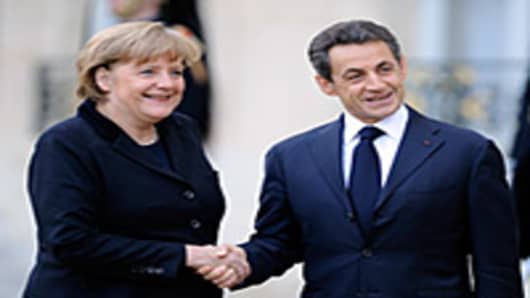The search for a silver bullet to fix Europe’s debt mess again has come up empty.
Like so many proposals that came before it, the tentative agreement crafted from Friday’s European summit generated a day of euphoria followed by careful reflection and, then, more pain.
Global equity markets slumped Monday, bringing an abrupt end to the sharp rally that began Nov. 28 on the perpetual hopes that policymakers are nearing the end of their long journey toward figuring out the continent’s sovereign debt mess.
There seemed to be two issues at the heart of the matter:
1) The UK’s refusalto go along with proposals that would have tied it more closely to the euro zone, of which it is not a member.
2) A delayed reaction from European Central Bank chief Mario Draghi’s comments Thursday that there will be no ECB bond-buying of the toxic southern European debt.
Britain vetoed provisions that would have required it to follow the same rules as the nations in the European Union that use the euro as its currency. Without the UK's cooperation, some fear it could threaten the very existence of the EU.
“History may yet judge harshly British Prime Minister David Cameron’s untimely request for a Big Mac at this historic feast and creating a less than binding resolution,” Andrew Wilkinson, chief economic strategist at Miller Tabak in New York, said in an analysis on the EU machinations. “Observers fear that the voluntary nature of national fiscal cuts waters down the political deal reached on Friday.”
Condemnation of Cameron’s stance was not universal. Dennis Gartman, a hedge fund manager and author of the widely followed Gartman Letter, praised Cameron for acting “courageously" in preserving London's independence.
“This was, from his perspective, an attack too severe upon British sovereignty and it was the breaking point that could not be papered over,” Gartman wrote.
Yet Gartman said Monday's weakness in stocks would be “ephemeral,” something that obviously did not hold up as trading progressed.
Critics said Cameron vetoed the Friday agreement because he was afraid to take a hard line on the country's banks, an allegation he denied.
Moody’s did little to lighten the mood, warning that it would continue to re-evaluate its position on European debt.
In total, Cameron’s proclamations kindled fears that if the European Union does not become fully subscribed to the uniform currency, chances for survival are slim.
In fact, some think that Friday’s market rally was itself unreasonable given the implications of the ECB position on buying the debt of Greece and the other periphery nations.
“We have warned already that courageous steps from the ECB would not prevent the euro-zone from breaking apart. But in their absence, the chances of some sort of break-up must surely be greater,” John Higgins, senior market economist at Capital Economics, said in a note. “We expect the selling pressure (for European debt) to build.”
“While the ECB met expectations of a further cut in interest rates and greater support for banks on Thursday, it emphatically dashed recently growing hopes that it is about to fire a silver bullet into the heart of the debt crisis by substantially ramping up its bond purchases,” Higgins’ colleague at Capital, chief European economist Jonathan Loynes, said in a separate analysis.
Miller Tabak’s Wilkinson said the events of the past several days provide a sobering reality for investors.
“While investors at large had become increasingly comfortable that the ECB held the key to resolving the debt crisis by standing behind national governments, such optimism is fast-fading,” he said. “While (Draghi) openly questioned interpretation of his earlier comments on the subject ahead of the summit last week and despite the fact he immediately hailed its delivery, Germany’s top banker poured more cold water on the theory that the central bank will intervene in government bond markets.”
Questions? Comments? Email us at NetNet@cnbc.com
Follow Jeff @ twitter.com/JeffCoxCNBCcom
Follow NetNet on Twitter @ twitter.com/CNBCnetnet
Facebook us @ www.facebook.com/NetNetCNBC



